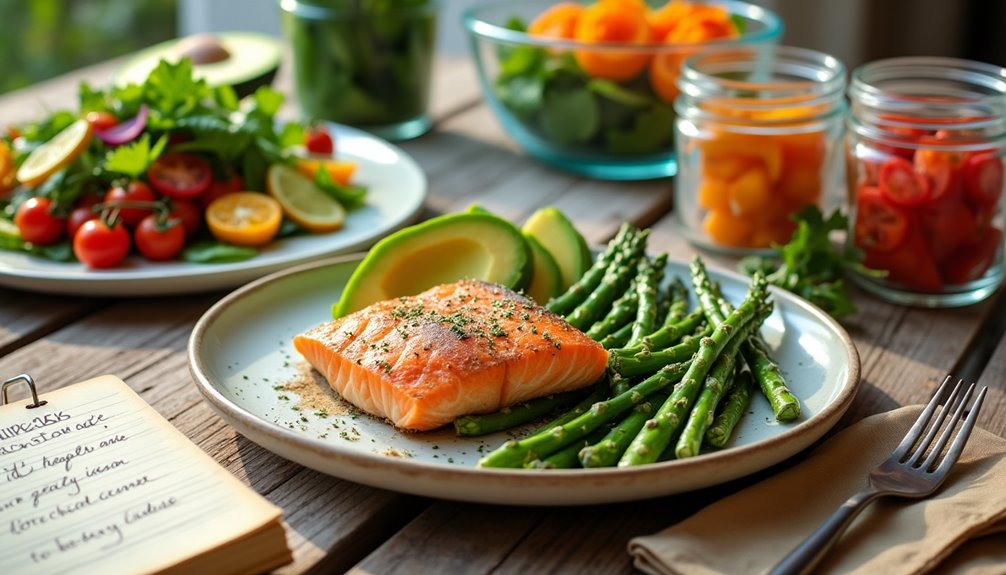The Whole30 Diet is a 30-day program that emphasizes consuming whole, unprocessed foods. You'll focus on nutrient-dense options like fresh fruits, vegetables, high-quality meats, and eggs while avoiding sugar, grains, dairy, and legumes. Many participants report benefits such as increased energy levels, better digestion, and even clearer skin. However, you might face challenges like intense cravings and the time commitment for meal prep. Success often comes from effective meal planning and support from the community. If you want to explore the insights and strategies that can make your Whole30 experience easier, there's much more to uncover.
Key Takeaways
- Whole30 is a 30-day program focusing on whole, unprocessed foods to improve health and well-being.
- The diet excludes sugar, grains, dairy, legumes, and processed foods while emphasizing fresh fruits, vegetables, and high-quality proteins.
- Benefits include improved digestion, increased energy, clearer skin, enhanced mental clarity, and potential weight loss.
- Meal planning and preparation are essential for success, including batch cooking and organized grocery lists.
- Post-Whole30, reintroduce foods mindfully while staying connected with the community for support and guidance.
What Is Whole30?

Whole30 is a 30-day dietary program designed to reset your eating habits and improve your relationship with food. It's a structured approach that emphasizes whole, unprocessed foods while eliminating sugar, grains, dairy, and legumes.
You're encouraged to focus on nourishing your body with nutrient-dense options like vegetables, fruits, and high-quality proteins. The Whole30 rules are straightforward, providing clear guidelines on what to include and what to avoid.
By strictly adhering to these rules, you'll likely notice significant Whole30 results, both physically and mentally. Many participants report improved energy levels, clearer skin, and better digestion.
You might also find that your cravings for sugar and unhealthy snacks diminish, allowing you to make more mindful choices. A plant-based diet, which includes nutrient-dense options, can further enhance your health journey by providing essential vitamins and minerals.
The program isn't just about weight loss; it's about developing a healthier relationship with food. You'll learn to recognize emotional triggers that lead to unhealthy eating patterns, fostering a sense of community among those who undertake the challenge alongside you.
Engaging with others on the same journey can create a supportive environment, making it easier to stay committed.
It's important to approach Whole30 with an open mind, as the results can vary from person to person. While some may experience dramatic changes, others may see more subtle shifts. Regardless of the outcome, the experience can be transformative, encouraging you to reflect on your eating habits and cultivate a lifestyle grounded in health and well-being.
Principles of Whole30

At the heart of the Whole30 program lie its foundational principles, which guide participants in transforming their eating habits. The approach emphasizes a commitment to whole, unprocessed foods for 30 days, allowing your body to reset and heal. This means focusing on nutrient-dense options like vegetables, fruits, lean proteins, and healthy fats while eliminating added sugars, grains, dairy, and legumes.
To make this journey easier, meal prep becomes essential. Planning ahead not only saves time but also keeps you on track. By preparing your meals in advance, you can guarantee you have compliant options ready, reducing the temptation to reach for quick, unhealthy choices.
Consider creating a weekly meal plan that includes a variety of recipe ideas, such as:
- zoodles with homemade marinara
- a hearty vegetable stir-fry
This keeps your meals exciting and helps you explore new flavors.
Another principle is to listen to your body. Throughout the 30 days, pay attention to how different foods affect your energy levels and mood. This awareness will empower you to make informed decisions long after the program ends. Incorporating these principles can help you avoid common pitfalls of dieting, such as falling off the weight loss plan, and ultimately support your long-term health.
Lastly, remember that community plays a significant role in Whole30. Engaging with others on the same path, whether through social media or local groups, fosters a sense of belonging and accountability. Share your meal prep tips and recipe ideas, and cheer each other on as you commence on this transformative journey together.
Foods to Avoid

To successfully navigate the Whole30 program, knowing which foods to avoid is crucial. Eliminating certain foods can help you reset your body and identify food sensitivities. Here's a quick breakdown of what you need to steer clear of during your journey:
| Foods to Avoid | Why Avoid Them? |
|---|---|
| Sugar | Can lead to cravings, weight gain, and inflammation. |
| Grains | Often trigger digestive issues and can contribute to food sensitivities. |
| Dairy | Common allergen; may cause bloating and digestive discomfort. |
| Legumes | Can interfere with digestion and are often inflammatory. |
| Processed Foods | Typically high in sugar, grains, and unhealthy fats, leading to poor health outcomes. |
By avoiding sugar, grains, dairy, and legumes, you're taking a significant step toward improving your overall health. Many people find that cutting these foods helps reduce cravings and regulate their energy levels. Remember, it's not just about what you're cutting out but also about creating a healthier relationship with food. Additionally, adopting a research-based approach can further enhance your understanding of how different foods affect your body.
You're not alone on this journey. Many have walked this path and found greater clarity and vitality by sticking to these guidelines. So, take a deep breath, and embrace the challenge. You're building a community of like-minded individuals who are committed to health and well-being. By knowing what to avoid, you're already on your way to success with Whole30!
Approved Whole30 Foods

What foods can you enjoy while following the Whole30 program? The Whole30 diet emphasizes whole, unprocessed foods that nourish your body and eliminate potential irritants. When you're grocery shopping, focus on fresh, wholesome ingredients that fit within the guidelines. Here are some approved foods you can include in your meals:
- Fresh fruits and vegetables
- High-quality meats and seafood
- Eggs and egg products
- Nuts and seeds (without added sugars)
Incorporating these foods into your Whole30 meal prep is vital for success. You'll find that there are numerous Whole30 recipe ideas that can inspire you to create delightful, gratifying meals. Think about grilled chicken with roasted vegetables, or an egg and avocado breakfast scramble. These meals not only keep you on course but also taste fantastic.
When dining out, it's possible to adhere to your Whole30 goals by selecting simple, clear-cut options. Look for grilled meats, fresh salads, and vegetables cooked in olive oil. Remember to inquire about sauces or dressings, as many contain concealed sugars or additives.
As you set off on this journey, connecting with others who are also following the Whole30 can enhance your experience. Share your favorite recipes, exchange grocery shopping tips, and support each other during those challenging moments. With the right foods and community support, you'll feel empowered to flourish on your Whole30 adventure! Additionally, following a plant-based diet can significantly reduce greenhouse gas emissions, making it a great choice for those looking to support the environment.
Benefits of Whole30

Embracing the Whole30 program can lead to a variety of health benefits that extend beyond just weight loss. Many participants report significant changes in their well-being, which can transform your relationship with food and your body. Here's a look at some of the key benefits you might experience:
| Benefit | Description | Evidence |
|---|---|---|
| Improved Digestion | Eliminating processed foods can reduce bloating and discomfort. | Studies show a link between whole foods and gut health. |
| Increased Energy Levels | Many find they have more energy throughout the day after the first week. | A balanced diet stabilizes blood sugar levels. |
| Clearer Skin | Cutting out certain food groups may help clear up skin issues. | Some research connects diet with skin health. |
| Weight Loss | Many people see changes in their body composition within 30 days. | Caloric deficit from wholesome foods often leads to weight loss. |
Additionally, adopting a clean eating approach, similar to custom keto diet plans, can offer structured guidance for those looking to improve their overall health and wellness.
Common Challenges

While the Whole30 program offers numerous benefits, participants often face several common challenges that can make the experience demanding. Understanding these hurdles can help you tackle them more effectively, ensuring a smoother journey through the program.
One of the primary challenges is cravings management. As you eliminate sugar, grains, and dairy, your body may fight back with cravings for these foods. Recognizing that this is a natural response can help you stay committed. Additionally, many individuals have found that implementing a structured plan, such as the 3X Diet System, can significantly enhance their ability to manage cravings.
Another significant challenge is the time commitment involved in meal prep. Preparing Whole30-compliant meals requires planning and effort, which can feel overwhelming at times.
Social gatherings can also pose difficulties. Maneuvering parties and dining out while sticking to the program may lead you to feel isolated or tempted. Planning ahead and communicating your dietary needs with friends can alleviate some of this pressure.
Here are some common challenges you might encounter:
- Cravings for prohibited foods: These can be intense, especially in the first week.
- Time commitment for meal prep: Finding time to cook can be tough, especially with a busy schedule.
- Managing social gatherings: It might be hard to stick to your goals in social settings where non-compliant foods are abundant.
- Emotional eating triggers: Stress and emotions can lead to the desire for comfort foods, making it hard to stay on track.
Meal Planning Tips

Effective meal planning is essential for successfully maneuvering through the Whole30 program. By organizing your meals in advance, you'll minimize the risk of reaching for non-compliant foods when hunger strikes. Start by dedicating some time each week to plan your meals.
Consider what you enjoy eating and look for recipe ideas that fit within the Whole30 guidelines. Websites, cookbooks, and social media platforms are rich with creative options, making it easier than ever to find inspiration.
Next, tackle your grocery shopping. Make a detailed list based on your meal plan, ensuring you have all the necessary ingredients on hand. Stick to the perimeter of the store where whole foods like fruits, vegetables, and proteins are typically located. This strategy helps you avoid processed foods that don't align with Whole30.
Batch cooking can be a game-changer. Spend a few hours preparing meals or components at once, like roasted vegetables, grilled meats, or compliant sauces. Store them in portion-sized containers for quick access throughout the week. This not only saves time but also helps you stay committed to the program. Additionally, incorporating smoothie meal replacements into your meal plan can provide quick and nutritious options that align with your dietary goals.
Success Stories

Transformative experiences abound among those who've completed the Whole30 program, showcasing a range of personal achievements and health improvements. Many participants find that the 30-day commitment leads to significant lifestyle changes that extend well beyond the program's conclusion. Here are some common success stories:
- Enhanced energy levels throughout the day
- Improved digestion and reduced bloating
- Increased awareness of food choices and cravings
- Weight loss and body composition changes
These testimonials highlight the diverse impacts of Whole30 on individual lives. For instance, some people report shedding pounds and feeling lighter, while others focus on the emotional benefits of breaking free from unhealthy food habits. The program encourages you to listen to your body, fostering a deeper connection to what you consume.
Moreover, participants often note the long-term effects of their journey. Many find that their newfound knowledge about nutrition empowers them to make healthier choices beyond the 30 days. They develop a more mindful approach to eating, which helps them maintain their progress and avoid reverting to old habits. Additionally, adopting low-carb, anti-inflammatory foods can further enhance your overall health and well-being.
The sense of community shared among Whole30 participants further solidifies their commitment to these lifestyle changes. By sharing experiences, strategies, and recipes, you can feel a sense of belonging and support. Ultimately, the Whole30 program isn't just a diet; it's a catalyst for lasting change in how you view food and health, paving the way for a more vibrant life.
Transitioning After Whole30

As you wrap up your Whole30 adventure, it's important to approach the shift back to regular eating with intention and mindfulness. The shift phase is essential, as you'll likely experience post Whole30 cravings for foods you've eliminated. Recognizing these cravings helps you make healthier choices rather than falling back into old habits.
Start by reintroducing foods one at a time, keeping a journal to track how your body responds. This allows you to pinpoint any sensitivities or adverse reactions. Many people find that certain foods, like dairy or gluten, may not sit well with them after a month of clean eating. By being aware of how each food affects you, you can make informed decisions moving forward.
Long term maintenance is crucial for sustaining the positive changes you've made. Consider adopting a flexible approach to your diet that incorporates Whole30 principles while allowing for occasional indulgences. This balance can help you avoid the feeling of deprivation that often leads to binge eating.
Stay connected with your Whole30 community for support and accountability. Sharing your journey can foster a sense of belonging and provide encouragement as you navigate this new phase. Remember, it's not about perfection but about progress. Embrace the lessons you've learned, and trust yourself to make choices that align with your goals and well-being. The shift doesn't mean you have to abandon your Whole30 mindset; instead, it's an opportunity to refine your relationship with food.
Additionally, addressing underlying health conditions such as diabetes and high blood pressure can significantly improve your overall wellness and support your transition after Whole30.
Frequently Asked Questions
Can I Drink Coffee on the Whole30 Diet?
You might be wondering if you can drink coffee. While traditional coffee isn't allowed, you've got some great coffee alternatives to explore. Consider herbal teas, coconut milk lattes, or even mushroom coffee for a rich flavor without the caffeine.
Is Whole30 Safe for Pregnant or Breastfeeding Women?
Imagine steering a river during a storm; you need to know the safest route. When it comes to dietary choices during pregnancy or breastfeeding, it's essential to take into account your nutrient needs and hormonal changes.
While Whole30 emphasizes whole foods, it mightn't meet all your requirements. Consult with a healthcare professional to make sure you're supporting both your health and your baby's, so you can guide through this journey confidently and safely.
How Do I Handle Social Events While on Whole30?
Handling social events can be tricky, but with some meal prep, you can navigate them smoothly. Before the event, prepare compliant snacks or dishes to bring along, ensuring you have something to enjoy.
When dining out, check the menu in advance and ask the staff about modifications. Communicate your dietary needs to friends, and you'll find that most people are supportive.
Are There Any Whole30-Friendly Snack Options?
When you're looking for snack options, you've got plenty of choices that are both satisfying and simple to prepare.
Think about easy recipes like veggie sticks with guacamole or homemade trail mix with nuts and dried fruit.
Meal prep can also help—prepare snacks in advance, so you always have something ready.
Can I Exercise While Following the Whole30 Program?
Absolutely, you can exercise while following a specific diet plan! Just pay attention to your energy levels and how your body feels. You might need to make some workout modifications initially, especially if you're adjusting to new eating habits.
Listen to your body, and don't hesitate to scale back intensity if you feel fatigued. It's all about finding balance and ensuring your fitness routine complements your dietary changes for best results.
Conclusion
In embracing the Whole30 diet, you're not just committing to a food program; you're committing to a journey of self-discovery, better health, and renewed energy. By eliminating processed foods, refining your relationship with food, and focusing on whole ingredients, you can uncover how different foods affect your body and mind. As you shift back to a wider diet, remember to maintain awareness, prioritize balance, and continue listening to your body's needs for lasting benefits.



